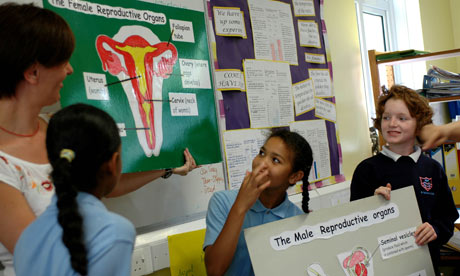
Sex education polarises opinion, sets legislators against parents and parents against schools and regularly inflames media opinion. Somewhere in the middle sit young people: ill-served, receiving confused messages and gaining their information from famously unreliable sources, such as peers or the internet.
Sex education, as all too many experience it, is like teaching people how to drive by telling them in detail what's under the bonnet, how the bits work, how to maintain them safely to avoid accidents, what the controls do and when to go on the road. It's all about the mechanics. And that's it.
There's a growing consensus that young people don't need sex education, they need comprehensive sexuality education. CSE is sex education plus: the mechanics, plus a lots more about sexuality.
That means not just teaching young people about the biology of sex, but also teaching them about the personal, emotional, societal and cultural forces which shape the way in which they choose to conduct their lives. Armed with this understanding, young people can make far more considered decisions.
This approach has the potential to unite the warring factions that bicker over the fundamental rights and wrongs of sex education: CSE equips young people with basic biological knowledge, but at the same time it equips them to question why they act in certain ways, and whether or not it is right, valuable or desirable to do so. CSE imparts information, and promotes responsibility.
CSE contains components which allow learners to explore and discuss gender, and the diverse spectrum of gender identities that exist within and between and beyond simple heterosexuality. It also contains components that examine the dynamics of power in relationships, and individual rights.
These are not taught as theoretical concepts. They have serious practical effects on the way in which young people interact with each other, both in the sexual and the wider social and educational spheres. Studies have shown that addressing such issues can have a marked impact both in school and the expansion of young people's social networks.
CSE also engages with what some doubtless regard as difficult territory. Sexuality – however, individually, we choose to regard it – is a critical aspect of personal identity. The pleasure that we derive from sexuality, even if that pleasure is the pleasure of feeling that a reproductive duty is being fulfilled, is a vital part of our lives: it's what makes us human. CSE views sexuality as a positive force.
CSE exploits a variety of teaching and learning techniques that are respectful of age, experience and cultural backgrounds, and which engage young people by enabling them to personalise the information they receive.
What is most telling is that a large number of studies have reached the clear conclusion that CSE does not lead to earlier sexual initiation or an increase in sexual activity. To paraphrase, traditional sex education seems to say: "If you're going to do it, this is how everything works and you need to protect yourself in these ways to prevent this." CSE says all that, but it also asks young people to ponder what exactly "it" is, and to deepen their perception of its implications.
In a political environment which is quantitatively driven, we measure the success of sex education in straightforward health behaviour indicators. These are easy to manage: numbers which build on existing health surveillance and measurement systems, and which are simple to understand from an objective point of view.
However, CSE is a far more nuanced discipline, and it will be necessary to include other measures of programme success: qualitative, subjective indicators which relate to gender equity, empowerment and critical thinking skills.
While governments have recognised young people's right to CSE via various intergovernmental resolutions and conventions, the journey from recognition to delivery will be a long one. Even in the UK, there are notable differences, with England having a bare-bones biological approach "puberty, menstruation, contraception, abortion, safer sex, HIV/Aids and STIs should be covered", while Wales and Scotland have curriculums which incline far more towards the CSE agenda.
The International Planned Parenthood Federation, the organisation I work for, and its 153 member associations around the world, has been instrumental in pressing for the adoption of international policy commitments to CSE. For many, it may seem like we are pushing 10 steps ahead of the agenda when the basic principle of young people's right to even the most basic introduction to the biology of sex is still not universally accepted.
Our view is different: it is that CSE is what will secure widespread acceptance of sex education, because it is about more than the mechanics of sex. It is about helping young people, the world over, to become more healthy, more informed, more respectful and more active participants in the life of their community and their nation.
Doortje Braeken is IPPF's senior adviser on adolescents and young people, responsible for co-ordinating programmes in 26 countries implementing a rights-based approach to youth friendly services and comprehensive sexuality education. She will be among the panellists for a live discussion on sex and sexuality education, taking place on the SocietyGuardian site from noon to 2pm on Thursday 31 May

